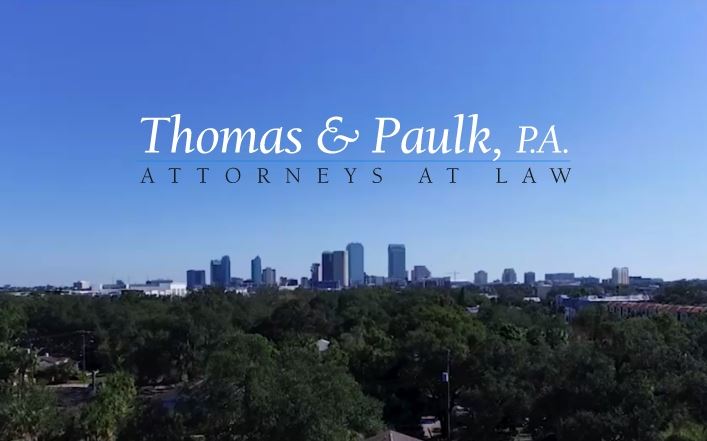
Any legal matter has the potential to be complex, and criminal cases are no different. That's why we're offering our experienced insight into Florida criminal offenses, proceedings, penalties, and more.
Providing You with What You Need to Know
Tampa, FL Criminal Defense Information
At Thomas & Paulk, we know just how difficult it can be to deal with the complications surrounding criminal cases. Our Tampa criminal defense lawyers are dedicated to providing accessible, effective legal counsel. For this reason, we have compiled information to help you better understand criminal matters in Florida.
Some of the topics that we discuss on this website include:
- Aiding / Abetting - It is a criminal offense to help a person commit a crime. This act of aiding another person is explained under Florida Statutes §220.905. If found guilty, you could be facing the same charges as the person who committed the crime.
- Conspiracy - The act of conspiracy does not refer to any particular offense but rather planning to commit a crime. When two or more people plan to break the law, they may be found guilty of conspiracy. This is tried one level below the crime itself.
- Expungements - Having a criminal history can be life-altering. Ever wanted to say “no” when someone asks if you’ve been charged with a crime? By clearing your criminal record, you may be able to. We can determine if you are eligible.
- Notice to Appear - If you have been served with a notice to appear, we can help answer your questions and provide you with a roadmap of what needs to be done. The first thing to remember? This is not a traffic ticket. You do need to appear in court.
- Obstruction of Justice - It is a crime to interfere with the carrying out of justice. This can include bribing witnesses, failing to report crimes, resisting arrest, threatening jurors, and interfering with law enforcement, prosecutors, judges, and more.
- Pre-File Investigations - In some cases, before charges are ever formally filed, there may be a pre-file investigation. These are when prosecution and law enforcement attempt to determine whether there is enough evidence to build a sufficient case.
- Probation Violation - Probation is a penalty typically served instead of prison. One major factor is the terms you must abide by, such as curfew, meetings with probation officers, keeping a clean record, etc. If accused of violating these terms, we can help.
- Warrants - Have you had a warrant issued in your name? Bench and arrest warrants are legal orders that require you to appear in court at a specific date and time. If one has been issued for you, our firm can help you understand what you need to do.
Don’t risk your reputation or your freedom by navigating complicated legal proceedings on your own. With the help of our experienced attorneys, you can have peace of mind knowing your future is in seasoned hands. We are dedicated to our clients' defense!
About Perjury in Florida
Perjury occurs when an individual has intentionally lied after swearing to tell the truth under the authority of a notary public, judge, or other authorized official. Perjury may occur in court, depositions, administrative hearings, answering interrogatories, or signing.
In Florida, the punishment for perjury varies:
- Perjury in an unofficial proceeding: This is punishable by up to 1 year in jail, up to 1 year of probation, and/or a maximum fine of $1,000.
- Perjury in an official proceeding: This is punishable by up to 5 years in prison, up to 5 years of probation, and/or a maximum fine of $5,000.
- Perjury in an official capital prosecution proceeding: This is punishable by up to 15 years in prison, up to 15 years of probation, and/or a maximum fine of $10,000.
Extradition in Florida
Extradition occurs when a state or a nation requests the return of a suspected or convicted criminal. After an extradition request has been made, the state or nation wherein the person is residing may surrender the criminal to the state or nation requesting the their return, after confirming the person's identity.
When it comes to extradition, the U.S. requires the following:
- There must be a valid demand from an executive authority.
- The request must include a copy of the indictment found or affidavit.
- This document must successfully prove the fugitive has been criminally charged.
- The document must be certified as authentic by the governor or chief magistrate.
- The receiving executive must cause the fugitive to be arrested and secured.
- After being notified that the fugitive is secure, an agent of the requesting executive must appear before the fugitive within 30 days, or they may be released.
Extradition laws can be complex and require a law firm with the experience it takes to make a real difference. At Thomas & Paulk, we have helped thousands of clients in Tampa and across Florida in the face of a wide range of criminal matters including extradition, DUI, perjury, probation violations, and more. We're standing by to see how we can help.
Want to schedule your consultation? Call us today at (813) 321-7323
Trusted Defense Counsel
Have you been arrested? Are you under investigation? It is the responsibility of the prosecution to prove your guilt beyond a reasonable doubt. By challenging the evidence or exposing a violation of your rights, our attorneys may be able to reduce your charges, win you a not guilty verdict, or have your case dropped altogether. Take the first step today!
-
We personally handle your defense strategy.
Our lawyers have been helping people just like you defend their future for decades.
View Results -
We always put our clients' cases and needs first.
Read our reviews to see what it is like working with our Tampa criminal defense law firm.
See Success Stories -
We're ready to hear your side of the story.
Tell us what happened to you during a completely free and confidential consultation.
Contact Us





